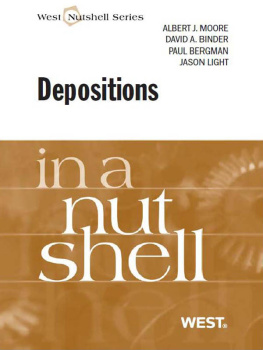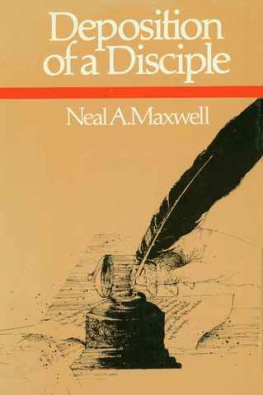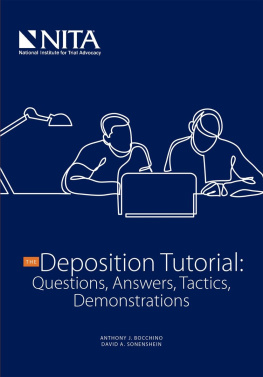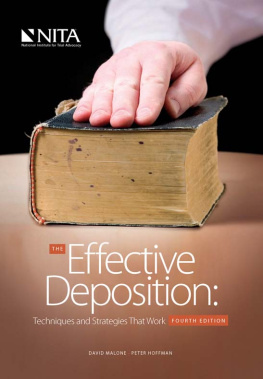Landmarks
Page list

WESTS LAW SCHOOL
ADVISORY BOARD
_________
JESSE H. CHOPER
Professor of Law and Dean Emeritus,
University of California, Berkeley
JOSHUA DRESSLER
Professor of Law, Michael E. Moritz College of Law,
The Ohio State University
YALE KAMISAR
Professor of Law, University of San Diego
Professor of Law Emeritus, University of Michigan
MARY KAY KANE
Professor of Law, Chancellor and Dean Emeritus,
University of California,
Hastings College of the Law
LARRY D. KRAMER
Dean and Professor of Law, Stanford Law School
JONATHAN R. MACEY
Professor of Law, Yale Law School
ARTHUR R. MILLER
University Professor, New York University
Formerly Bruce Bromley Professor of Law, Harvard University
GRANT S. NELSON
Professor of Law, Pepperdine University
Professor of Law Emeritus, University of California, Los Angeles
A. BENJAMIN SPENCER
Professor of Law,
Washington & Lee University School of Law
JAMES J. WHITE
Professor of Law, University of Michigan
I
DEPOSITIONS
IN A NUTSHELL
By
ALBERT J. MOORE
Professor of Law
University of California, Los Angeles
DAVID A. BINDER
Professor of Law
University of California, Los Angeles
PAUL BERGMAN
Professor of Law
University of California, Los Angeles
JASON LIGHT
Lecturer in Law
University of California, Los Angeles

Mat #40755033
II
Thomson Reuters created this publication to provide you with accurate and authoritative information concerning the subject matter covered. However, this publication was not necessarily prepared by persons licensed to practice law in a particular jurisdiction. Thomson Reuters does not render legal or other professional advice, and this publication is not a substitute for the advice of an attorney. If you require legal or other expert advice, you should seek the services of a competent attorney or other professional.
Nutshell Series, In a Nutshell and the Nutshell Logo are trademarks registered in the U.S. Patent and Trademark Office.
2011 Thomson Reuters
610 Opperman Drive
St. Paul, MN 55123
18003139378
Printed in the United States of America
ISBN: 9780314194893
III
ACKNOWLEDGEMENTS
_________
To our research assistants Elizabeth Bosch and Kevin Sanders our sincerest thanks for your hard work and your dedication. Our thanks also to the UCLA Academic Senate and the Law School Deans Fund for their financial support.
We also want to thank all the volunteers in the UCLA witness program, who have played the role of deponents in countless simulations, and the students and clients in our Depositions courses at UCLA Law School. We learned more from you than you did from us.
ALBERT J. MOORE
DAVID A. BINDER
PAUL BERGMAN
JASON LIGHT
Los Angeles, Calif.
August 2010
V
THE SCOPE OF THIS BOOK
_________
This book focuses on deposition questioning strategies and techniques that maximize the likelihood that you can:
* Obtain helpful answers to critical questions.
* Find out everything deponents know about important topics and events.
* Undercut harmful testimony that emerges at deposition.
* Obtain information from deponents who claim not to understand your questions or who interpret your questions in a hypertechnical way.
* Exploit deponents conflicting statements.
* Respond to opposing counsels objections and obstructionist tactics.
* Undermine adverse experts opinions.
The book has the following four parts.
Part One:
Deposing Adverse Witnesses
Part One illustrates common questioning strategies and techniques you might employ in the context of the most common type of deposition, the deposition of an adverse percipient witness. This part discusses strategies and techniques for (a) obtaining VI complete information, (b) encouraging deponents to provide your desired answer, (c) responding to incomplete, evasive or non-responsive answers, (d) undermining harmful testimony and (e) responding to inconsistent or implausible statements. Part One concludes with a discussion of how to respond to objections, instructions not to answer and obstructionist behavior of opposing counsel.
Part Two:
Preparing to Depose Adverse Witnesses
Part Two describes techniques and strategies for preparing yourself to take a deposition of an adverse witness. Experienced readers have undoubtedly developed their own system for preparation. Those readers can use the strategies and techniques in Part One whether or not they choose to employ the approach to deposition preparation described in this Part Two. This Part concludes with a discussion of the rules and procedures for arranging for depositions.
Part Three:
Special Depositions
Part Three focuses on taking special depositions, including those of an adverse expert, a Rule 30 (b) (6) deponent, and those to preserve the testimony of your own witness for trial.
Part Four:
Defending Depositions.
Part Four explores strategies and techniques for preparing a client or witness for a deposition VII and for defending at depositions taken by opposing counsel.
XLI
DEPOSITIONS
IN A NUTSHELL
PART ONE
DEPOSING ADVERSE WITNESSES
This part (Chapters 1 through 15) illustrates common questioning strategies and techniques you might employ in the context of the most common type of deposition, the deposition of an adverse percipient witness. This part discusses strategies and techniques for obtaining complete information, encouraging deponents to provide your desired answer, responding to incomplete, evasive or non-responsive answers, undermining harmful testimony and responding to inconsistent or implausible statements. This part concludes with a discussion of how to respond to objections, instructions not to answer and obstructionist behavior of opposing counsel.
CHAPTER 1
THREE PRIMARY DEPOSITION GOALS
This Chapter focuses on three primary deposition goals you commonly pursue when deposing an adverse witness. These goals are: (1) obtaining a deponents version of significant events; (2) searching for and confirming helpful evidence; and (3) uncovering and undermining harmful evidence. The questioning strategies and techniques discussed throughout this book help you pursue these three goals.
The Chapter concludes with a brief discussion of the typical goals you pursue when deposing a neutral witness.
1. Goal #1Obtain an Adverse Witness Version of Significant Events
For the reasons discussed below, you typically want to obtain a deponents version of significant events. Of course, you cannot pursue every detail about every event about which the deponent has knowledge. Instead, you have to use your judgment to decide which events are significant enough to inquire into. And to the extent possible, you want to elicit testimony about these events in chronological order. Consider the following examples of versions of significant events:
* In an auto accident case, a deponents version of significant events might consist of the events leading up to the accident, the accident itself, and the events following the accident (e.g., treatment for physical injuries, car repairs, etc.).










